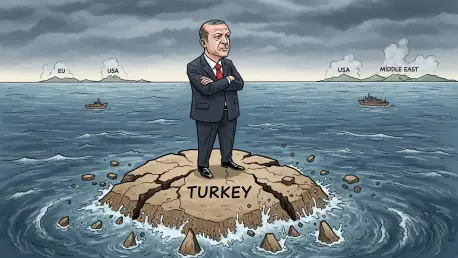Turkey finds itself at a pivotal moment under the leadership of President Recep Tayyip Erdogan, whose assertive policies and governance approach are raising alarms about the nation’s trajectory on the global stage, drawing increasing comparisons to Iran, a country long marginalized due to its confrontational stance in international affairs. Erdogan’s blend of populist strategies, ambitions to restore Turkey’s historical influence, and bold foreign policy decisions are steering the country toward potential regional and international isolation. As Turkey navigates a complex web of geopolitical challenges, from strained alliances to contentious regional interventions, the implications of these choices cast a long shadow over its future stability and standing. This examination delves into the mechanisms of Erdogan’s rule, the risks embedded in his vision, and the striking parallels with Iran’s path, offering a clear perspective on the dangers that lie ahead for Turkey if current trends persist unchecked.
Populist Governance and Domestic Manipulation
Erdogan’s leadership style exemplifies a broader global trend of populist governance, where the pursuit of personal power often overshadows the broader national interest. Central to this approach is a tight grip on domestic narratives, achieved through extensive control over media outlets. By curbing independent journalism and shaping public discourse, Erdogan crafts an image of himself as an unassailable leader, vital to Turkey’s resurgence. High-profile international engagements are often spun as triumphs, reinforcing his stature at home while masking the economic and diplomatic costs. These costs, including inflation and hidden debts tied to foreign deals, remain obscured from much of the Turkish populace. This deliberate opacity ensures that public support remains aligned with his agenda, even as the long-term consequences of such policies—ranging from financial strain to eroded democratic institutions—begin to accumulate beneath the surface, threatening Turkey’s internal cohesion.
Beyond media manipulation, Erdogan’s domestic strategy involves consolidating power through economic and institutional control. Loyal allies dominate key sectors, creating a network of oligarchs who bolster his regime while legal systems are increasingly politicized to suppress dissent. This centralization of authority mirrors tactics seen in other populist regimes worldwide, where the leader’s image as a defender of national pride is paramount. Foreign policy decisions are often leveraged to enhance this perception, with actions like defiant military purchases or strategic summits framed as assertions of sovereignty. Yet, this focus on personal gain over collective well-being risks alienating critical segments of society and international partners alike. The lack of transparency about the true economic burdens, such as undisclosed financial obligations from foreign agreements, further deepens the disconnect between the government’s narrative and the realities faced by ordinary citizens, setting a precarious foundation for future stability.
Neo-Ottoman Vision and Regional Friction
Erdogan’s ambition to revive Turkey’s historical role as a leading power in the Islamic world, often termed Neo-Ottomanism, drives much of his foreign policy and creates significant friction with neighboring states. This vision pits Turkey against regional heavyweights like Saudi Arabia, challenging their influence while undermining initiatives such as the Abraham Accords, which seek to normalize ties between Israel and Arab nations. Support for groups like Hamas in Gaza and Islamist factions in Syria further complicates Turkey’s position, aligning it against Israeli and American interests in the Middle East. Such stances echo Iran’s role as a regional antagonist, prioritizing ideological goals over pragmatic cooperation. As a result, Turkey risks alienating potential allies, finding itself increasingly isolated in a region already fraught with tension, where its actions are perceived as provocative rather than unifying, thus narrowing its diplomatic options.
This Neo-Ottoman posturing also extends to Turkey’s broader regional engagements, often exacerbating existing conflicts rather than resolving them. By positioning itself as a counterweight to established powers, Turkey invites suspicion and hostility from nations wary of its intentions. The backing of controversial causes, while bolstering Erdogan’s image among certain domestic and international constituencies, undermines efforts to build constructive partnerships. This approach not only strains relations with key players in the Middle East but also risks drawing Turkey into protracted disputes with little strategic gain. Much like Iran, which has faced decades of isolation due to similar ideological pursuits, Turkey’s current path could lead to a shrinking circle of allies, leaving it vulnerable to economic sanctions or diplomatic reprisals. The pursuit of historical grandeur, while resonant with nationalist sentiments at home, thus carries a steep price on the global stage, threatening to marginalize Turkey further.
Defiant Foreign Policy and Strained Western Ties
Erdogan’s foreign policy choices often reflect a deliberate defiance of Western norms and alliances, pushing Turkey away from its traditional partners like NATO and the United States. A prime example is the acquisition of Russian S-400 missile systems, a move framed as an assertion of national sovereignty but one that has provoked significant backlash from Western allies. Partnerships with leaders like Vladimir Putin, including collaborations on energy projects, further signal a shift toward non-Western alignments. While these actions may resonate domestically as bold stands against external pressure, they jeopardize Turkey’s standing within long-standing security frameworks. The resulting tensions highlight a dangerous gamble, as Turkey risks losing the strategic support and economic benefits tied to its Western affiliations, mirroring Iran’s trajectory of alienation from global systems.
Additionally, Erdogan’s international maneuvers are frequently tailored to domestic political gain rather than long-term national strategy. High-profile summits and engagements with controversial figures are leveraged to project strength and independence, yet they often lack substantive outcomes for Turkey’s broader interests. This pattern of prioritizing optics over diplomacy has led to a series of missteps, straining relations with key powers at critical junctures. The reliance on foreign funds from nations like Qatar and Russia to prop up domestic initiatives, including electoral campaigns, adds another layer of vulnerability, as these arrangements often come with hidden costs or dependencies. As Turkey drifts further from the Western orbit, it faces the prospect of navigating global challenges with diminished support, a situation akin to Iran’s persistent struggles to maintain influence amid widespread diplomatic estrangement, raising serious questions about the sustainability of such a course.
Echoes of Iran and the Isolation Threat
The similarities between Turkey’s current direction under Erdogan and Iran’s long-standing geopolitical stance are both striking and concerning. Both nations pursue policies fueled by ideological fervor and a rejection of Western dominance, often at the expense of regional collaboration and international acceptance. Erdogan’s involvement in Central Asia, support for contentious causes, and dependence on foreign financing from select partners all point to a path of potential isolation. These actions, while bolstering his image as a defiant leader, position Turkey as a state increasingly at odds with global norms, much like Iran. The risk of becoming a pariah looms large, as Turkey could face active dangers—be they economic penalties or military tensions—while its circle of reliable partners continues to shrink, leaving it exposed in a volatile region.
Reflecting on this trajectory, it becomes evident that the costs of such a stance are already manifesting in subtle but significant ways. Turkey’s regional interventions and ideological posturing have drawn criticism and suspicion, limiting opportunities for constructive dialogue with neighbors and global powers alike. The parallels with Iran extend beyond policy to the broader implications of sustained antagonism, where isolation breeds economic hardship and security risks. Erdogan’s reliance on strategic but controversial alliances further entrenches this dynamic, as short-term gains mask the long-term erosion of Turkey’s diplomatic leverage. If unchecked, this path could see Turkey grappling with the same challenges of marginalization that have defined Iran’s international relations for decades, a scenario that demands urgent reconsideration of current strategies to avoid a future of exclusion and instability.
Navigating a Different Future
Looking back, Erdogan’s tenure has revealed a complex interplay of ambition and risk that has shaped Turkey’s geopolitical landscape in profound ways. His populist tactics and defiant foreign policy have positioned the nation at a crossroads, with isolation akin to Iran’s experience as a tangible threat. Moving forward, a recalibration of priorities could steer Turkey away from this precipice. Strengthening ties with Western allies through renewed dialogue and adherence to shared security frameworks might rebuild trust and provide economic stability. Regionally, fostering cooperation rather than confrontation, particularly with Middle Eastern neighbors, could open pathways to mutual benefit. Domestically, transparency in governance and media freedom would empower citizens to engage critically with national policies. These steps, though challenging, offer a blueprint for Turkey to redefine its global role, ensuring it avoids the pitfalls of alienation and instead charts a course toward integration and resilience.









